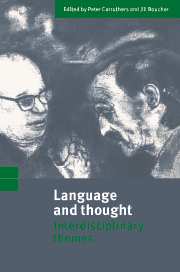Book contents
- Frontmatter
- Contents
- List of contributors
- Preface
- 1 Introduction: opening up options
- Part I Language, development and evolution
- Part II Language, reasoning and concepts
- Introduction to part II
- 6 Aphasic language, aphasic thought: an investigation of propositional thinking in an a-propositional aphasic
- 7 Representing representations
- 8 Magic words: how language augments human computation
- 9 The mapping between the mental and the public lexicon
- 10 Convention-based semantics and the development of language
- Part III Language and conscious reasoning
- References
- Author index
- Subject index
10 - Convention-based semantics and the development of language
Published online by Cambridge University Press: 08 January 2010
- Frontmatter
- Contents
- List of contributors
- Preface
- 1 Introduction: opening up options
- Part I Language, development and evolution
- Part II Language, reasoning and concepts
- Introduction to part II
- 6 Aphasic language, aphasic thought: an investigation of propositional thinking in an a-propositional aphasic
- 7 Representing representations
- 8 Magic words: how language augments human computation
- 9 The mapping between the mental and the public lexicon
- 10 Convention-based semantics and the development of language
- Part III Language and conscious reasoning
- References
- Author index
- Subject index
Summary
Introduction
A natural and historically popular view of the relation between meaning in public natural languages and thought is that thought is metaphysically prior, that natural language meaning depends on the meaning or content of mental states of one sort or another. Today this view is most closely associated with the work of Paul Grice and various philosophers broadly inspired by Grice's original work. This work (which I shall refer to collectively as ‘Convention-Based Semantics’) ultimately seeks to ground natural language meaning in a complex web of beliefs and intentions of language users. Many versions of Convention-Based Semantics have been put forward and, in spite of the numerous objections and purported counterexamples which have been raised against various versions of the theory, it remains the dominant view about the nature of natural language semantic properties amongst philosophers.
While I am sympathetic with these philosophers in their attempt to ground language in thought, I think that Convention-Based Semantics is wrong, not just in detail, but fundamentally. One basic way in which Convention-Based Semantics seems to me to go wrong is in assimilating natural language linguistic meaning to communicative phenomena generally. In my view it is a mistake to try to find a common reductive analysis that will ground natural language meaning and the meanings variously associated with pantomime gestures, with lighthouse beacon patterns, with hand gestures to help a friend back her car into a tight spot and any of a variety of other forms of meaningful communication.
- Type
- Chapter
- Information
- Language and ThoughtInterdisciplinary Themes, pp. 201 - 218Publisher: Cambridge University PressPrint publication year: 1998
- 8
- Cited by

